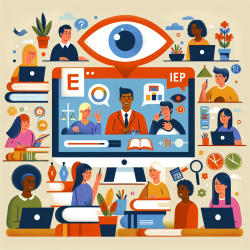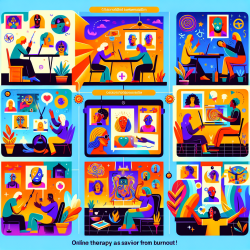Individualized Education Program (IEP) meetings are pivotal moments in the educational journey of students requiring special education services. As a Special Education Director, your role in these meetings is crucial for setting the tone and ensuring that each student’s needs are met effectively. With the rise of online therapy services, such as those provided by TinyEYE, there are new tools and strategies available to enhance the IEP planning process.
The Importance of Effective IEP Meetings
IEP meetings are designed to bring together a team of professionals, including educators, therapists, and parents, to develop a customized education plan for students with special needs. These meetings ensure that the student receives the appropriate support and services to succeed academically and socially. Effective IEP meetings are characterized by clear communication, collaboration, and a focus on the student’s unique needs and goals.
How Online Therapy Enhances IEP Planning
Online therapy services, such as those offered by TinyEYE, provide a flexible and accessible solution for integrating therapeutic support into the IEP process. Here are some ways online therapy can enhance IEP planning:
- Accessibility: Online therapy eliminates geographical barriers, allowing students to receive consistent therapy sessions regardless of location.
- Convenience: Scheduling online therapy sessions can be more convenient for both students and therapists, reducing the need for travel and allowing for more flexible session times.
- Comprehensive Data: Online platforms often include tools for tracking progress and collecting data, which can be invaluable during IEP meetings to demonstrate student growth and areas needing attention.
- Collaboration: Online therapy platforms facilitate better communication between therapists, educators, and parents, ensuring that everyone involved in the student’s education is on the same page.
Steps for Integrating Online Therapy into IEP Meetings
To effectively incorporate online therapy into your IEP meetings, consider the following steps:
- Identify Student Needs: Begin by assessing the specific needs of the student. Determine which therapeutic services are required and how online therapy can meet these needs.
- Select a Reputable Provider: Choose a reliable online therapy provider, such as TinyEYE, that specializes in services for special education students.
- Collaborate with Therapists: Work closely with online therapists to develop a clear understanding of the student’s goals and how therapy will be integrated into their IEP.
- Utilize Data and Reports: Make use of the data and progress reports provided by the online therapy platform to inform the IEP team about the student’s progress and any adjustments needed.
- Engage Parents: Ensure that parents are actively involved in the IEP process and understand how online therapy will support their child’s education.
Benefits of Online Therapy for Special Education
Online therapy offers several benefits that make it an excellent addition to the IEP planning process:
- Personalized Support: Online therapy can be tailored to meet the individual needs of each student, providing targeted interventions that address specific challenges.
- Consistency: Regular online therapy sessions help maintain consistency in therapeutic support, which is crucial for the progress of students with special needs.
- Resource Efficiency: By reducing travel time and costs, online therapy allows schools to allocate resources more efficiently, potentially providing more frequent and diverse services to students.
Conclusion
Integrating online therapy into IEP meetings can significantly enhance the planning and delivery of special education services. By leveraging the flexibility, accessibility, and comprehensive data provided by online therapy platforms like TinyEYE, Special Education Directors can ensure that students receive the support they need to thrive. As the landscape of education continues to evolve, embracing innovative solutions like online therapy will be key to meeting the diverse needs of all students.










